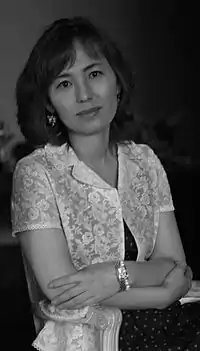孔枝泳
孔枝泳(韓語:,1963年1月31日—),韩国女作家,1980年代至1990年代曾震撼了韩国文坛[1]。
| 孔枝泳 | |
|---|---|
 攝於2005年 | |
| 出生 | 1963年1月31日 |
| 国籍 | |
| 职业 | 小说家 |
| 活跃时期 | 1988年至今 |
| 語名稱 | |
| 諺文 | |
| 汉字 | |
| 文观部式 | |
| 马-赖式 | |
生平
孔枝泳1963年生於首爾,毕业于延世大學文学专业[2]。她曾三度结婚和离婚,并有3个子女[2]。
1987年孔枝泳因反對選舉開票不當,參加示威遊行而被抓進看守所,這次經驗成為創作小說的開端,讓她立定成為小說家。1988年开始写作,内容主要围绕着女性、工人、贫困者,以及受到歧视的人[3]。
1998年,孔枝泳出版以兒時成長經驗為藍本的《鳳順姊姊》。2005年孔枝泳出版《我們的幸福時光》。2009年,孔枝泳在無意間得知光州聾啞學校性侵事件,寫下小说《熔炉》,之後被改编成2011年电影,上映后大获成功。
英语著作
韩语著作
- 1993 - Go Alone Like a Rhino Horn
- 1994 - Mackerel
- 2002 - My Sister Bongsoon
- 1999 - Crying Existence
- 2000 - Who We Are, Where We Are From, Where We Are Going? (received seventh 21 Century Literary Award in 2001)
- 2005 - Films of My Life
- 2005 - 我們的幸福時光
- 2006 - I Was Alone Like a Raindrop
- 2006 - The Unhurt Soul
- 2009 - People in the Bible for Children
- 2009年6月30日 - 熔爐
参考资料
- http://www.amazon.com/dp/8988095928
- . [2012-10-24]. (原始内容存档于2012-02-26).
- Korean Writers and Novelists. Minumsa Publishing, 2005. p55
This article is issued from Wikipedia. The text is licensed under Creative Commons - Attribution - Sharealike. Additional terms may apply for the media files.